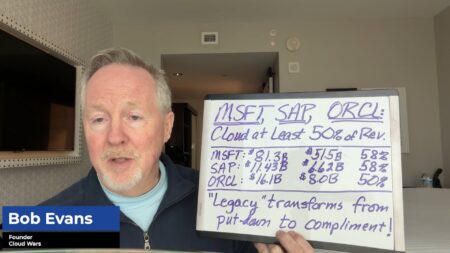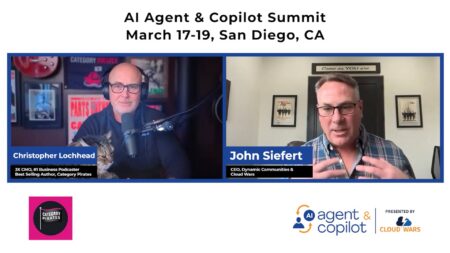In his own understated but high-impact way, Workday cofounder and CEO Aneel Bhusri has become one of the world’s most-bullish evangelists for the extraordinary power and potential of machine learning.
“We’ve always talked about predictive analytics but they’re now a reality—and it’s really a reality,” Bhusri said in a recent exclusive interview.
“It’s what we’ve dreamed about for a long time. But we never actually got there because the technologies weren’t there—but now they’re here.”
And Bhusri is making sure that Workday—which is on the verge of posting its first billion-dollar quarter—is at the forefront in giving corporate customers the full benefits of ML’s transformative capabilities.
“Machine learning is just so profound, right? It’s impacting all of our lives in so many ways,” Bhusri said when I brought up his comment that ML will be even more disruptive than the cloud.
The “Pied Piper of Machine Learning”
“Internally I described my role to the company as ‘the pied piper of machine learning,’” he said with a chuckle. “And I asked every employee in the company to buy the book Prediction Machines and charge it back to Workday because we all have to get comfortable with this new world and be able to succeed in it and be able to talk to our customers about it.”
It looks like one of the ways Bhusri is helping Workday’s entire workforce “to get comfortable with this new world” is by letting them know that he’s driving the conversation for that conversion.
“For me there’s actually something very gratifying when I can say, okay, not going to try to get the engineers to work on five different things,” says Bhusri, who refers to himself self-effacingly as “a products guy.”
“So every time I see one of our engineers or developers, I ask, ‘what are you doing on machine learning?’ Or ‘what do you think about machine learning?’ And ‘what should we be doing with machine learning?
“Pretty soon they’re all saying, ‘Okay, before I meet with Aneel, I know he’s going to ask about machine learning so I should have my act together,” Bhusri said. “It gets everybody on the same page—people are excited.”
RECOMMENDED READING
Machine Learning More Disruptive than Cloud, Says Workday CEO Aneel Bhusri
Workday CEO: Oracle and SAP Can’t Match Us in Fortune 100
As SAP, Oracle and ServiceNow Lose Leaders, Who Wins CEO Shuffle?
Archrivals Oracle and Workday Agree on One Thing: SaaS Market Booming
Workday Faces 3 Key Questions as $4-Billion Run Rate Looms
Workday’s Secret Weapon Has “Phenomenal” First Year
Oracle Will Dethrone SAP as World’s #1 ERP Vendor, Vows Larry Ellison
Bhusri even said ML—and Workday’s unconditional commitment to mastering it and exploiting it to its fullest extent across all of the company’s products—has become an additional contributor to Workday’s ability to retain top talent.
“We’ve been at the cloud thing for a while now, and that was a really great innovation and disruptive technology,” he said.
“But for our top engineers, they always want to do something disruptive and new, and today that is machine learning. So it’s reinvigorating our best and brightest to say, hey, Workday is going to continue to innovate so if I want to do something new and cutting-edge in machine learning, well, I can do it right here at Workday.
“I don’t have to go do a machine-learning startup.”
Here are some additional thoughts Bhusri shared with me on top-priority issues.
Why ML is more disruptive than cloud.
“The cloud has been a huge help with the traditional IT objective of process automation, but there’s only so far you can go with process automation. With the cloud, it’s a better user experience and better business process automation. Then the cloud companies started to build in analytics, but until machine learning came along, as much as we all talked about the value of analytics, they were still mostly backwards-looking. They’d report on what happened in the past. And what these machine-learning algorithms let you do is predict what might happen in the future. That’s never really happened before in the world of computer science.
“So what does that mean for companies that can actually have an insight as to what the future might look for? I mean, if you have an insight versus someone who doesn’t, I’d rather be the one that has the insight, right?”
Workday’s dual commitments to advanced technology and to customer success.
“In many ways, we’re still the same company we were 10 years ago—just bigger. We’re still very committed to innovation—not innovation for innovation’s sake, but for delivering real value for customers. And we’ve scaled to meet the needs of the largest companies in the world—something our competitors have not done.” (You can read all about that at Workday CEO: Oracle and SAP Can’t Match Us in Fortune 100.)
“But we don’t actually spend a lot of time thinking about how to beat the competition. We think about how we can make life better for our customers, and that sorts itself out. Jeff Bezos is a big driver of that: if you focus on the competition, you get distracted from the customer.”
The soaring value of data and the unlimited opportunities for ML.
“Machine learning is at least as important as the cloud was in terms of giving customers real competitive advantage over the next five to 10 years. If you can harness the power of your data, you will have a massive competitive advantage. Whether it’s in your core business, whether it’s claims processing for a financial-services company, or it’s the HR piece or the finance piece, machine learning can be used in all those places—wherever you have big data sets.”
The booming market for data and analytics among HR executives.
“I’m really pleased with is how the HR organizations are stepping up on data. The vast majority of finance professionals have been data-driven probably since the days of the abacus. By its nature, finance is a data driven business. But HR hasn’t always been, but it’s becoming one really quickly.
“It’s amazing just how quickly HR leaders are realizing, ‘Hey, we need to get on top of our data. We need to figure out how we can use the Skills Cloud, how can we use machine learning to identify opportunities.”
For ML to reach its full potential, it must be built into the platform, not added on as a feature.
“We’ve been at it for three years. I think we first started out thinking about it as app-by-app and then we realized, this is foundational. It’s got to be built into the platform. Because we can’t predict all the uses of machine learning, and we shouldn’t try to predict all of them. We should give the customers the tools to do it the way they want to do it. But over time we’ll see patterns where all the customers are wanting to do this one thing—and if that’s the case, we’ll build an app for them. If they want to do something that’s unique to them, they’ll do that. But if a lot of customers are asking us for the same machine-learning driven app, well, then we’ll build it for them.
“You can only do that if it’s really a foundational part of the tools, not just a feature on one app. And that has historically always been the way we thought about new technology: rather than just make it applicable to one app, you’ve gotta build it into the foundation so all of our apps can use it.”
On having five distinct product categories addressing key customer needs.
“We’ve always thought of ourselves as the new kid on the block—but now we wake up and we have 2,800 large HR customers! So we moved some of the sales force more towards selling back to that same customer base. Not being overly pushy, but selling back to that customer base because now that it’s such a big base, a lot of them became customers before we had all these new modules. And we want to make sure they know what we have, make sure they know about finance and planning and Prism Analytics.” (For more on one of those key categories, Workday Adaptive Insights Planning, please see Workday’s Secret Weapon Has “Phenomenal” First Year.)
Expanding “Plan, Execute, Analyze” by adding “Extend” via Workday Cloud Platform.
“I’ve typically talked about how Workday helps companies plan, execute, and analyze. Only recently have I begun to add ‘extend’ via our new Platform offering.
“The Workday Cloud Platform is going into general availability, after a couple of years in limited availability. It’s now battle-tested, we’ve grown that set of APIs, and I’m really interested to see how our customers use it. There’s clearly a huge demand for things that we’re not going to build, but that are extensions… So I’m really curious to see how it gets used and it could evolve into a platform where ISV’s build more apps on it, but we’re going to start with our customers and I don’t know if it’ll be meaningful from a revenue perspective next year, but I think it’ll be meaningful from a usage perspective.”
Disclosure: at the time of this writing, Workday was a client of Evans Strategic Communications LLC.
Subscribe to the Cloud Wars Newsletter for in-depth analysis of the major cloud vendors from the perspective of business customers. It’s free, it’s exclusive, and it’s great!








